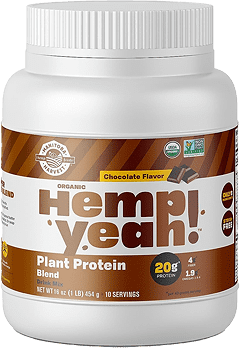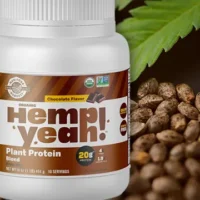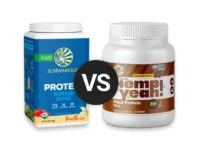Knowledge BaseYou're Questions Answered
How much protein is in hemp protein powder?
Hemp protein powder is a popular plant-based protein supplement derived from the seeds of the hemp plant (Cannabis sativa). It is known for being a rich source of high-quality protein, as well as other beneficial nutrients like fiber, essential fatty acids, and minerals. The protein content in hemp protein powder can vary depending on the specific product and processing methods used, but it generally provides a significant amount of protein per serving.
Protein Content in Hemp Protein Powder
On average, hemp protein powder contains approximately 15 to 20 grams of protein per 30-gram serving (about 1/4 cup). This translates to roughly 50-66% protein by weight, depending on the product. The protein content can vary based on factors such as the degree of processing and whether the powder includes additional ingredients1.
Factors Influencing Protein Content
- Processing Method: The method used to process hemp seeds into protein powder can affect the protein concentration. More refined hemp protein powders tend to have a higher protein content, as they undergo additional processing to remove more of the fiber and fat, resulting in a more concentrated protein product.
- Whole Seed vs. Concentrate: Some hemp protein powders are made from whole hemp seeds, which include fiber and fats, resulting in a lower protein concentration. Others are more concentrated, containing fewer non-protein components and thus offering a higher percentage of protein.
Nutritional Profile and Benefits
In addition to being a good source of protein, hemp protein powder provides a complete amino acid profile, including all nine essential amino acids necessary for human health. It is also rich in omega-3 and omega-6 fatty acids, which support cardiovascular health, and contains dietary fiber, which aids digestion2. The presence of essential minerals like magnesium, iron, and zinc further enhances its nutritional value.
Usage and Considerations
Hemp protein powder can be used in a variety of ways, including in smoothies, shakes, baking, and cooking. It is particularly beneficial for those looking for a plant-based protein source that is free from common allergens such as dairy, soy, and gluten. However, due to its relatively lower protein concentration compared to some other protein powders, individuals may need to consume larger servings to meet their protein needs, depending on their dietary goals and activity levels.
- Callaway, J. C. (2004). Hempseed as a nutritional resource: An overview. Euphytica, 140(1-2), 65-72.
- House, J. D., Neufeld, J., & Leson, G. (2010). Evaluating the quality of protein from hemp seed (Cannabis sativa L.) products through the use of the protein digestibility-corrected amino acid score method. Journal of Agricultural and Food Chemistry, 58(22), 11801-11807.
Related Questions
Related Reviews
Protein vs Protein

Your Answer
We are a participant in the Amazon Services LLC Associates Program, an affiliate advertising program designed to provide a means for us to earn fees by linking to Amazon.com and affiliated sites.




